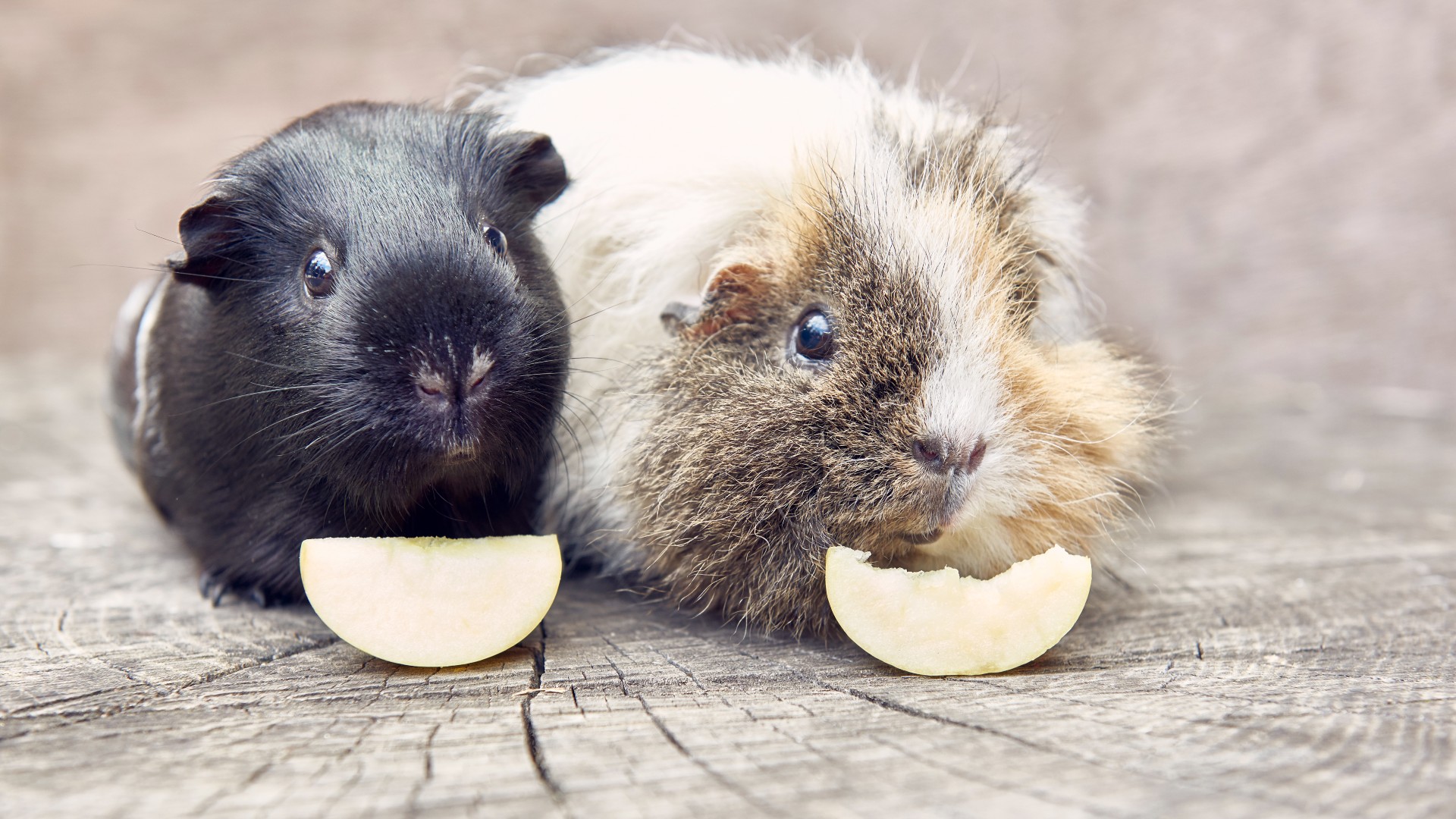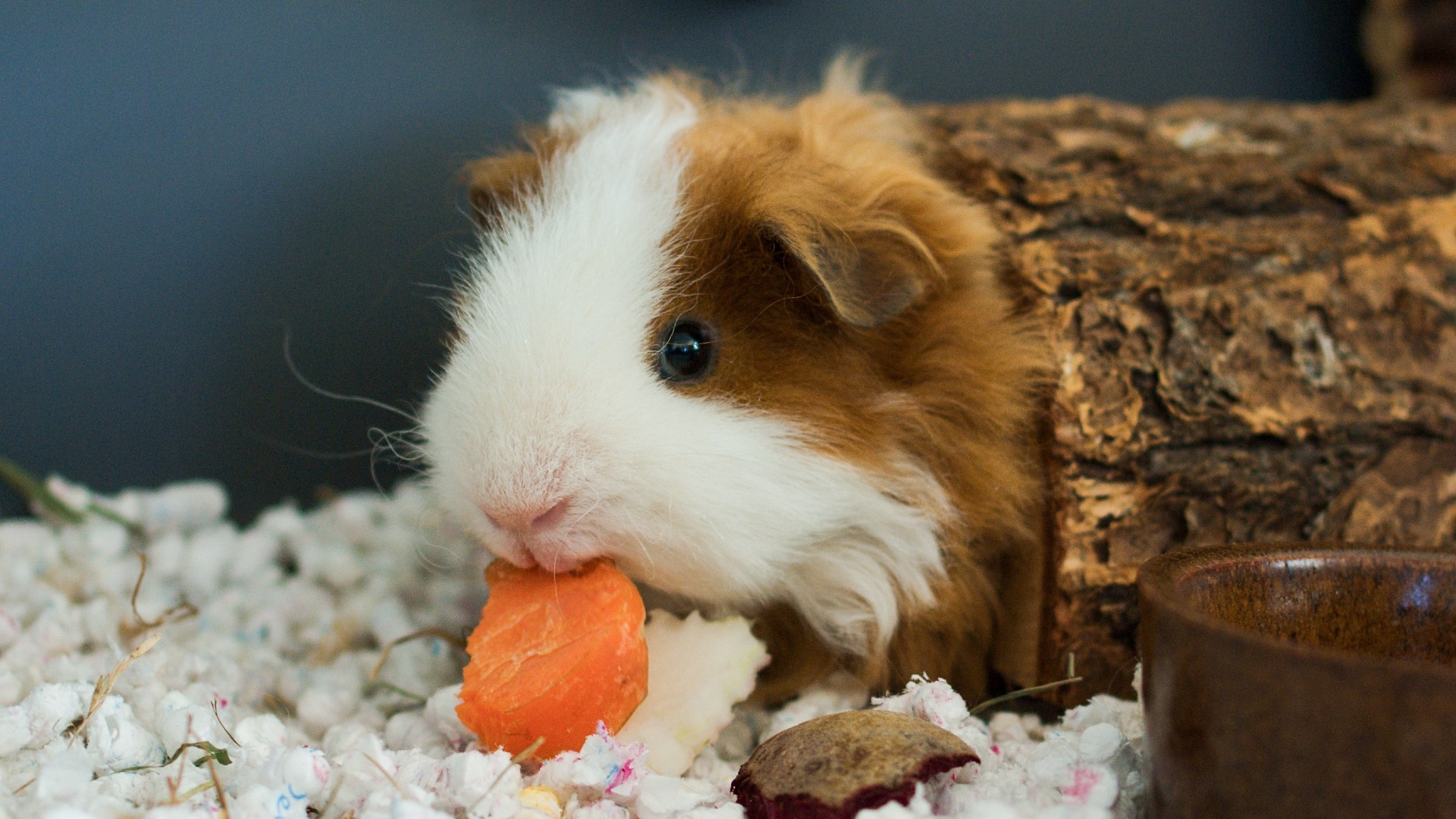What do guinea pigs eat? The best foods to feed your cavy
We answer the question ‘what do guinea pigs eat?’ and provide you with a list of safe foods to include in your furry friends daily diet

Get the best advice, tips and top tech for your beloved Pets
You are now subscribed
Your newsletter sign-up was successful
What do guinea pigs eat? If you’ve just welcomed one of these furry little creatures into your family, then alongside investing in the best guinea pig accessories, finding out what foods to include in their daily diet to keep them happy and healthy is likely high on your to-do list.
The most important thing to know before you adopt a guinea pig is that these pocket pets are herbivores, which means alongside eating hay, the only other foods that are safe for them to consume are fruits and vegetables.
Alongside avoiding all animal products, nuts and seeds (all of which a guinea pig's delicate digestive system is unable to process), you’ll also want to avoid dishing them up too much fruit, most of which is very high in sugar.
While fruit makes for a great treat in small quantities, for optimal health and wellbeing, the bulk of your guinea pig's diet should consist of hay and green, leafy vegetables that are accessible throughout the day as these pocket pets like to graze.
To help you know which foods are safe for your guinea pig to consume and which ones should be given sparingly or not at all, we’ve put together this handy guide to assist you in creating a nutritionally balanced and delicious diet for your furry friend.
What do guinea pigs eat?
Guinea pigs are herbivores, which means they only eat plants and plant–based foods. Because a guinea pig’s teeth are constantly growing, their digestive system evolved to break down fibrous foods, which, when consumed, help to wear their teeth down and keep them at a comfortable length.
Being a herbivore means that while the digestive system is capable of handling large quantities of hay, vegetables and fruit, it lacks the necessary enzymes to break down animal protein, nuts and seeds. It’s important you steer clear of any animal-based products (such as meat, eggs, and cheese) as ingesting these will make your pocket pet very ill.
Get the best advice, tips and top tech for your beloved Pets
The good news is, there are plenty of delicious and nutritious fruits and vegetables that your fur friend can munch on that, alongside hay, will provide them with all the vitamins and minerals they need to ward off obesity, dental disease, gastrointestinal problems and other potential health issues.
Hay is the most important part of your cavy’s diet and they should have access to this 24/7. Remember, your pocket pets teeth grow continuously and munching on abrasive grasses will help prevent them from becoming overgrown or infected.
Most pet parents tend to opt for timothy and orchard grass hays, but meadow and oat are also good choices. Steer clear of alfalfa or clover hay unless you have a baby guinea pig or one who is pregnant, as these grasses are high in calcium which can lead to bladder stones.
What vegetables can guinea pigs eat?
Vegetables are a rich source of nutrition for your fur friend, but how much you give them will depend on how well their digestive system is able to tolerate it. Some cavy’s can consume quite a lot of fresh produce, while others can struggle with diarrhea if they eat too much in one sitting.
You can offer a selection of vegetables to your guinea pig on a daily basis, but just be mindful that they’re still eating their hay. Some cavy’s love their vege so much that they’ll actually neglect their hay if given half the chance, so keep an eye on that as they still need to consume hay to keep their teeth healthy.
Vegetables and herbs that are safe for you fur friend to consume, include:
- Romaine lettuce
- Bell peppers
- Carrots
- Spinach
- Kale
- Broccoli
- Artichoke
- Cucumbers
- Brussel sprouts
- Chicory
- Basil
- Celery stalks and leaves
- Beet greens
- Coriander
- Zucchini
- Kohlrabi
- Fennel
- Mint
- Thyme
- Swiss chard
If you’re wanting to introduce new vegetables into your cavy’s diet, be sure to add these in one at a time, monitoring them closely to see how they respond. We recommend opting for organic produce if you can afford it as these are free from pesticides.

What fruits can guinea pigs eat?
Fruit can make a wonderful addition to your guinea pigs diet and it can help add some much needed variety, not to mention a touch of sweetness. That being said, fruit is very high in sugar and because of that it should be given sparingly as a treat so as not to upset your cavy’s gastrointestinal tract.
We recommend feeding your guinea pig small, bite-sized portions of fruit a few times a week to provide them with adequate vitamin C. Cavy’s can’t produce their own vitamin C, which makes them vulnerable to scurvy, so fruit given sparingly will ensure they get a regular dose of this essential vitamin.
Here are some fruits that are safe for guinea pigs to consume in small quantities:
- Apples
- Pears
- Strawberries
- Raspberries
- Blueberries
- Cranberries
- Kiwifruit
- Bananas
- Peaches
- Papayas
- Pineapples
- Cantaloupes
- Oranges
Berries are a good choice when it comes to the fruit group that’s the safest to feed your cavy on a regular basis (a few times a week) as they’re low in sugar and carbohydrates. Acidic fruits, such as oranges and pineapples, are best given on a more occasional basis.
Foods guinea pigs can’t eat
As you know, guinea pigs are herbivores, which means animal products need to be avoided, but just because they can eat plants and plant-based foods, that doesn’t mean that all of them are suitable for consumption. Some foods can be toxic while others are simply not good for their digestive system and can cause stomach upsets.
Here are the foods you’ll want to avoid feeding your cavy:
- Onions
- Garlic
- Mushrooms
- Iceberg lettuce
- Nuts
- Seeds
- Dried beans
- Corn
- Dairy
- Meat of any kind
- Avocado
- Potatoes
- Chocolate
- Peanut butter
- Rhubarb
- Bread
If you let your guinea pig out of their cage regularly and allow them to roam freely around your garden or inside your home, it’s important to note that many flowers and plants are toxic to our little fur friends and can cause serious illness or death if ingested.
We recommend that you always supervise your guinea pig when they’re out of their cage and if you suspect that they’ve eaten something that they shouldn’t, take them to the vet immediately and have them checked out.

Kathryn is a freelance writer who has been a member of the PetsRadar family since it launched in 2020. Highly experienced in her field, she's driven by a desire to provide pet parents with accurate, timely, and informative content that enables them to provide their fur friends with everything they need to thrive.
Kathryn works closely with vets and trainers to ensure all articles offer the most up-to-date information across a range of pet-related fields, from insights into health and behavior issues to tips on products and training.
When she’s not busy crafting the perfect sentence for her features, buying guides and news pieces, she can be found hanging out with her family (which includes one super sassy cat and a kitten), drinking copious amounts of Jasmine tea and reading all the books.
She has written for a range of publications, including Fit&Well, Top Ten Reviews, LiveScience, Goodto, and Product Hunt.
